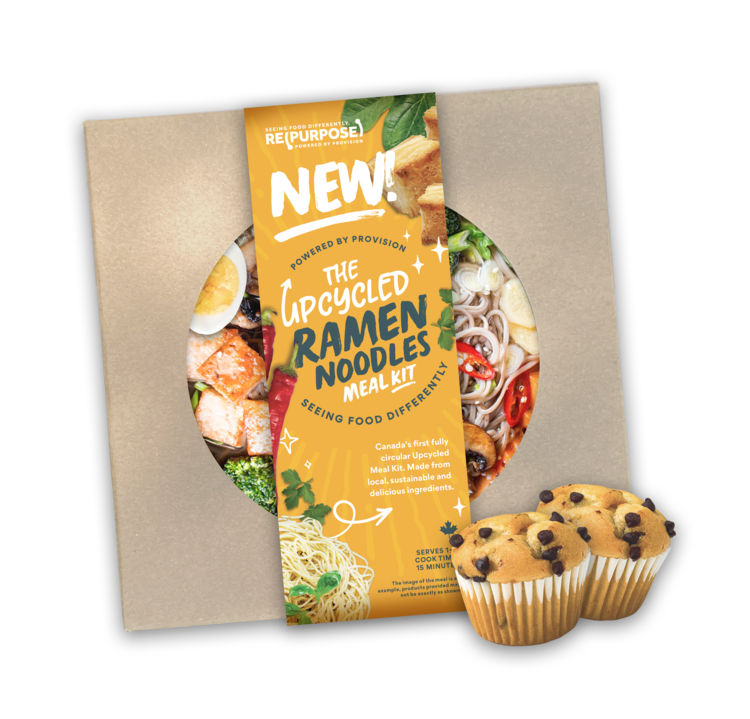Bringing together chefs, restaurants, food and beverage companies and grocery retailers, the first-ever Upcycled Food Festival in Canada launched on October 27, auspiciously during Canada’s Waste Reduction Week. Supported by the Grain Farmers of Ontario and the Canadian Agricultural Partnership, and organized by Provision Coalition Inc., – a network of food and beverage industry sustainability experts – the Festival’s mission is to tackle food waste while demonstrating that healthy, fully sustainable, and delicious meals can be made from upcycled, wasted food.
At the in-person launch attendees had the chance to try new and inventive meals prepared by chefs who leveraged upcycled foods from food and beverage by-products (though we weren’t able to make the event, the SEE Change team had the pleasure of trying one meal with very positive results!). These products and meals kits are now available for purchase, while restaurants and food outlets across Toronto are offering their own upcycled culinary creations for consumers to try this November for a limited time.
SEE Change spoke with Cher Mereweather, president & CEO of Provision Coalition, to learn more about the Festival, why it came about, and how the organizers are hoping to change the way people think about food waste – and the innovative ways to tackle it.
What inspired you to launch this Festival? What are you hoping to achieve?
We took the decision to launch this first edition of the Upcycled Food Festival in order to help grow the conversation around upcycling in this country, both for consumers and for the food and beverage industry.
Fifty-eight percent of all the food we produce in Canada is wasted, and a significant portion of that comes from the way that we make and process our food. Think about the glass of orange juice that you drank this morning…when you’ve pressed the juice out of the oranges you are left with peels – and more often than not they get thrown away (or at best, composted or sent off to animal feed). But those peels are still packed with nutrients and goodness, and so upcycling is about figuring out how to capture all that value and turn it into new ingredients or even new products, helping to both reduce our food waste and create more social innovation in the process!
The Festival runs for the month of November and is primarily targeted on consumers and the media, to help Canadians connect with upcycling (maybe for the first time). And in turn, by showing the positive reaction of Canadian consumers, we hope to also influence food and beverage companies to invest more time and energy into upcycling their unavoidable by-products.
And finally, to support the food and beverage industry and particularly to support new socially innovative entrepreneurs and start-ups who also see the potential of upcycling, we have launched the RePurpose Incubator! This is another first – an incubator dedicated solely to upcycling food and beverage by-products and to supporting companies, both large and small, in creating new upcycled ingredients and/or products.
What do you wish people knew about food insecurity that they may not know now?
We waste 58 percent of all the food we produce in Canada. And it costs about $49 billion each year – which to put in perspective is about 16 percent of the Canadian federal budget for 2020, and more than we spend each year on Old Age Security Pension payments. These are big, big numbers.
Preventing and reducing food waste will not directly reduce food insecurity. But it will put more food into the system while also reducing the cost of that waste.
What do you wish people understood about upcycling that may help attract their support?
That upcycled food is delicious, sustainable and often local. In the case of the Upcycled meal kit, we are taking Okara – an unavoidable by-product from tofu production done in the GTA and then transforming it into the noodles – again in the GTA, before selling those noodles at retailers and in restaurants – once again across the GTA. The product is delicious (and you don’t need to trust our word on that, you can ask chefs like Chris Locke at Marben or Chef Bradley at Compass Group!), it’s completely sustainable and is made and sold within 100km, so very local as well.
We also want to encourage innovators, foodies or anyone with a social entrepreneurial fibre to think about the huge opportunities for upcycling in food. This is a new frontier in reducing food waste and creating a more sustainable food system and it’s ripe for
What partners are currently on board, and in what capacity?
We have a whole host of partners on board, from food companies, to retailers, food service companies, food industry associations, academic institutions, Chefs and restaurants and more. Each partner is bringing their specific skill-set and experience to the table to help drive this new conversation. For a full, up-to-date list of partners, please visit https://upcycledfoodfest.ca
What are your plans for the future?
We are thrilled at the response this first edition of the festival is garnering and we have already begun conversations with our partners about what next year might look like! And while the festival only runs for the month of November, our goal is very much to drive a conversation and build momentum that will last way beyond these four weeks and will help us ensure that upcycling is a big part of a more sustainable food system here in Canada.

